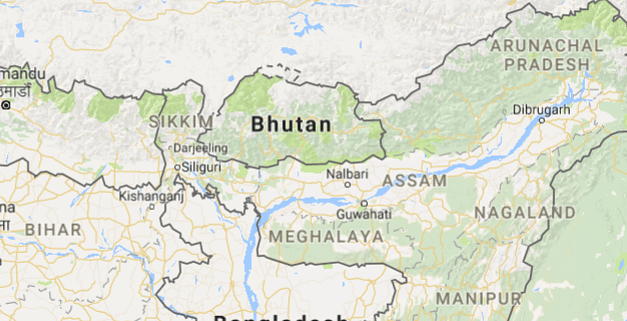Insta
Sikkim Border Stand-Off: Is China’s Boundary Dispute With Bhutan The Cause Of Its Trouble With India?

Bhutan’s location.
The ongoing stand-off between India and China in the state of Sikkim may have something to do with the latter’s border dispute with Bhutan.
In its statement on Tuesday, the Chinese Foreign Ministry had accused Indian troops of crossing into its territory and stopping the construction of a road that China was building in what is called the Donglang region (or Doklam Plateau).
The Donglang region located in the western part of Bhutan, close to the Sikkim-China-Bhuan tri-junction, is a part of the territorial dispute between China and Bhutan. The region is reportedly controlled by Thimphu, and Beijing claims a part of the region, 89 square kilometre in size, as its own.
The region holds immense strategic importance, both for India and China. The region which lies east of Sikkim, has a commanding view of the Chumbi Valley and overlooks the narrow Silguri Corridor that links the northeast to the rest of India.
If the Chinese gain control of the Donglang region, they will hold a commanding position in the Chumbi Valley and would gain the ability to essentially cut off India’s access to the northeastern states in case of a conflict. This calculation, as we explained earlier, could have prompted India’s action.
The two countries share a 470-km border and have overlapping claims. The importance of Donglang can be understood from the fact that Beijing, reportedly in 1996, indicated that it was ready to give up much of its territorial claims in northern Bhutan if Thimphu accepts Donglang as a territory of China.
Border negotiations between Bhutan and China started in 1984. As Bhutan has no formal diplomatic relations with China, negotiations took place under India’s aegis. However, this is not the case anymore. The two nations had their twenty-fourth round of boundary negotiations in August 2016. Although India enjoys overwhelming influence in Thimphu, it no longer participates in the border talks.
Support Swarajya's 50 Ground Reports Project & Sponsor A Story
Every general election Swarajya does a 50 ground reports project.
Aimed only at serious readers and those who appreciate the nuances of political undercurrents, the project provides a sense of India's electoral landscape. As you know, these reports are produced after considerable investment of travel, time and effort on the ground.
This time too we've kicked off the project in style and have covered over 30 constituencies already. If you're someone who appreciates such work and have enjoyed our coverage please consider sponsoring a ground report for just Rs 2999 to Rs 19,999 - it goes a long way in helping us produce more quality reportage.
You can also back this project by becoming a subscriber for as little as Rs 999 - so do click on this links and choose a plan that suits you and back us.
Click below to contribute.
Latest